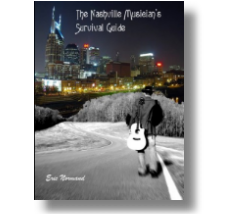Nashville Tennessee remains a prime destination for many musicians, songwriters, artists, and industry professionals, and in light of the city’s unique musical heritage, this constant influx will unlikely stop anytime soon. But beneath the suggestive title of “Music City” is a place that for many newcomers might be more aptly titled “Mystery City”. For in reality, the Nashville music scene is a massive, diverse, competitive, and ever-changing community whose true scope and nature are near invisible to those not working within it. Becoming one of the few fortunate musicians to find work and acceptance within this community can be a formidable task, and even when those goals seem to have been achieved, sustaining that career long term can be just as challenging, as I have learned first-hand.
My Nashville adventure began like many transplants to Music City, a cross-country pilgrimage with a U-Haul full of belongings, some life savings, big ideas, and no clue about what I was getting myself into. That first year of 2002 would prove one of the hardest, with my wife and I both trying relentlessly to find employment, struggling to pay the bills, and earning the bulk of our income by selling off possessions on eBay while going out on the town at night to network. About one year into this new life, the networking paid off, and I landed a job as a guitar tech on the Toby Keith 2003 Shock ‘N Y’ all tour, a true financial lifeline. I have spent most of my years since that tour working for country music artist and songwriter Rhett Akins as tour manager, band leader, and lead guitarist. Along the way I have, and continue, to work some in-town club gigs and recording sessions and I still panic trying to pay the bills every winter when the touring season slows to a crawl. Overall, I am earning a living from music and I credit this good fortune to having an invaluable combination of skills, work ethic, and a friend in the music community who pointed me in the right direction.
This kind of good fortune is not the case for all who venture to Music City, and along my journey I have met many struggling musicians and artists who have had much harder luck. At a recent blues jam, I met a drummer who had been in Nashville for about a year. He had done a couple of gigs in town, but nothing consistent, and nothing that came close to paying any bills. He was doing his best to try to insert himself into the scene but wasn’t having much success. “How do you get a road gig, or any gig in this town for that matter?” he asked. I could see the look of desperation in his eyes as he told me that his savings were now all used up and he wasn’t sure what he was going to do next.
Unfortunately, this kind of story is far more common in Nashville.
That conversation, as well as other similar tales, led me to the realization that the world outside of the Nashville music community knew very little of its inner workings, and that there is a real need for this information to be available to the masses. What originally began for me as a series of blogs and message board postings has now evolved into the soon to be completed book “The Nashville Musician’s Survival Guide” with its companion website www.survivenashville.com. Written from my perspective of being a working musician, the book outlines the structure and potential jobs within Nashville’s recording, touring, and nightclub communities. The basic job requirements, pay scales, and networking required to land those jobs are explored in great detail. Additional perspective in the form of several recent and ongoing interviews with music professionals will also be put forth, including A-list session bassist Mike Chapman, self-made indie artist Colt Ford, touring musicians, nightclub musicians, club owners, songwriters, engineers, managers, bus drivers, and more.
Nashville is a funny place. Everybody comes here to fulfill their dreams in music but most are unable to survive for any real length of time. Many of those who do survive long-term end up so trapped in the business end of things that their musical integrity often suffers. It seems that for many people, the Nashville experience isn’t what they hoped it would be. The key to surviving Nashville is to have a clear vision about your long-term goals, find different ways to earn income working within the current music scene while working towards those long-term goals, and use your relationships and connections from within the music community for financial survival and to achieve your long-term goals. None of this can be accomplished without some knowledge about the current state of the Nashville music community, a long-term commitment to this place and without building real, lasting relationships. It is my hope that this book and website will help some to accomplish their dreams.
In the meantime, good luck on the path.



Leave a Reply
You must be logged in to post a comment.